List of Nobel laureates affiliated with Cornell University
This list of Nobel laureates affiliated with Cornell University comprehensively shows the alumni, faculty members as well as researchers of Cornell University who were awarded the Nobel Prize or the Nobel Memorial Prize in Economic Sciences. The Nobel Prizes are awarded annually by the Royal Swedish Academy of Sciences, the Karolinska Institute, and the Norwegian Nobel Committee to individuals who make outstanding contributions in the fields of chemistry, physics, literature, peace, and physiology or medicine.[1] They were established by the 1895 will of Alfred Nobel, which dictates that the awards should be administered by the Nobel Foundation. Another prize, the Nobel Memorial Prize in Economic Sciences, was established in 1968 by the Sveriges Riksbank, the central bank of Sweden, for contributors to the field of economics.[2]
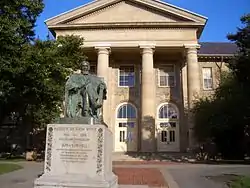
As of October 2020, 61 Nobel laureates have been affiliated with Cornell University as alumni, faculty members and researchers, and 50 of them are officially listed as "Cornell's Nobel Laureates" by the university.[3] Among the 61 laureates, 18 are Cornell alumni (graduate and attendees), 19 are long-term faculty members and 28 are researchers (four overlaps).[4] Subject-wise, the Nobel Prize categories of Physics and Physiology or Medicine account for 23 and 15 awards to Cornell-affiliated laureates, respectively.
Inclusion criteria
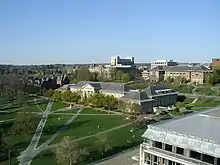
The university affiliations in this list are all official academic affiliations such as degree programs and official academic employment. Non-academic affiliations such as advisory committee and administrative staff are generally excluded. The official academic affiliations fall into three categories: 1) Alumni (graduates and attendees), 2) Long-term Academic Staff, and 3) Short-term Academic Staff. Graduates are defined as those who hold Bachelor's, Master's, Doctorate, or equivalent degrees from Cornell, while attendees are those who formally enrolled in a degree program at Cornell but did not complete the program; thus, honorary degrees, posthumous degrees, summer attendees, exchange students, and auditing students are excluded. The category of "Long-term Academic Staff" consists of tenure/tenure-track and equivalent academic positions, while that of "Short-term Academic Staff" consists of lecturers (without tenure), postdoctoral researchers (postdocs), visiting professors/scholars (visitors), and equivalent academic positions. At Cornell, the specific academic title solely determines the type of affiliation, regardless of the actual time the position was held by a laureate.
Further explanations on "visitors" under "Short-term Academic Staff" are presented as follows. 1) All informal or personal visits are excluded from the list; 2) all employment-based visiting positions, which carry teaching/research duties, are included as affiliations in the list; 3) as for award/honor-based visiting positions, to minimize controversy this list takes a conservative view and includes the positions as affiliations only if the laureates were required to assume employment-level duty (teaching/research) or the laureates specifically classified the visiting positions as "affiliation" or similar in reliable sources such as their curriculum vita. To be specific, some award/honor-based visiting positions such as the "Baker Lectureship" at Cornell University are awards/honors without employment-level duty.[5] In particular, attending meetings and giving public lectures, talks or non-curricular seminars at Cornell University is not a form of employment-level duty. Finally, summer visitors are generally excluded from the list unless summer work yielded significant end products such as research publications and components of Nobel-winning work, since summer terms are not part of formal academic years.
The "A.D White Professorship-at-Large (A.D.W Professor)" at Cornell University is an academic appointment which has a definite duration of appointment (six years).[6] This is similar to adjunct professorship instead of usual visiting professorship (note that the University Count considers the A.D White Professors as full-time academic staff).
| Laureate | Nobel Prize | Year | Role in Cornell University |
|---|---|---|---|
| Gerhard Herzberg | Chemistry | 1971 | George Fisher Baker Non-Resident Lecturer in Chemistry (1968)[7] |
| Linus Pauling | Chemistry & Peace | 1954 &
1962 |
George Fischer Baker Non-Resident Lecturer in Chemistry (1937) & Messenger Lecturer (October 1959)[8] |
Summary
All types of affiliations, namely alumni, long-term and short-term academic staff, count equally in the following table and throughout the whole page.[lower-alpha 1]
In the following list, the number following a person's name is the year they received the prize; in particular, a number with asterisk (*) means the person received the award while they were working at Yale University (including emeritus staff).[lower-alpha 2] A name underlined implies that this person has already been listed in a previous category (i.e., multiple affiliations).
Nobel laureates by category
Nobel Prize in Physics
| No. | Laureate | Image | Year | Relation | Rationale |
|---|---|---|---|---|---|
| 1 | George Paget Thomson |  |
1937 | Non–Resident Lecturer, 1929-1930 | "for their experimental discovery of the diffraction of electrons by crystals" |
| 2 | Isidor Isaac Rabi |  |
1944 | B.Chem. 1919
Graduate study 1921–23 (transferred) |
"for his resonance method for recording the magnetic properties of atomic nuclei"[9] |
| 3 | Richard Feynman |  |
1965 | Professor of Physics, 1945-1950 | "their fundamental work in quantum electrodynamics, with deep-ploughing consequences for the physics of elementary particles" |
| 4 | Hans Bethe | 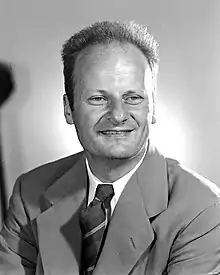 |
1967 | Professor of Physics, 1935-2005 | "for his contributions to the theory of nuclear reactions, especially his discoveries concerning the energy production in stars"[10] |
| 5 | Hannes Alfvén | 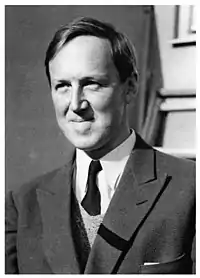 |
1970 | Distinguished Professor in Engineering | "for fundamental work and discoveries in magnetohydro-dynamics with fruitful applications in different parts of plasma physics"[11] |
| 6 | John Robert Schrieffer |  |
1972 | A.D. White Professor-at-Large, 1969–1975 | "for [his] jointly developed theory of superconductivity, usually called the BCS-theory".[12] |
| 7 | Brian David Josephson
Co-recipient with Leo Esaki and Ivar Giaever |
 |
1973 | NSF Fellow, 1971–1972[13] | "for their experimental discoveries regarding tunneling phenomena in semiconductors and superconductors, respectively" and the other half to Brian David Josephson "for his theoretical predictions of the properties of a supercurrent through a tunnel barrier, in particular those phenomena which are generally known as the Josephson effects"[14] |
| 8 | Sheldon Glashow
Co-recipient with Abdus Salam and Steven Weinberg |
 |
1979 | B.A., 1954 | "for their contributions to the theory of the unified weak and electromagnetic interaction between elementary particles, including, inter alia, the prediction of the weak neutral current"[15] |
| 9 | Steven Weinberg
Co-recipient with Abdus Salam and Sheldon Glashow |
 |
1979 | B.A. 1954 | "for their contributions to the theory of the unified weak and electromagnetic interaction between elementary particles, including, inter alia, the prediction of the weak neutral current"[15] |
| 10 | Kenneth G. Wilson | 1982 | Professor of Physics, 1963-1988 | "for his theory for critical phenomena in connection with phase transitions"[16] | |
| 11 | Pierre-Gilles de Gennes |  |
1991 | Served on the Cornell faculty as A.D. White Professor-at-Large 1977–1983 and Bethe Lecturer in Physics 1989–1990 | "for discovering that methods developed for studying order phenomena in simple systems can be generalized to more complex forms of matter, in particular to liquid crystals and polymers"[17] |
| 12 | Russell Alan Hulse
Co-recipient with Joseph Hooton Taylor, Jr. |
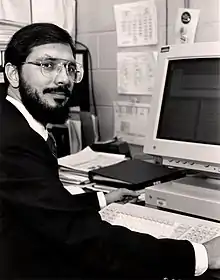 |
1993 | Scholar at Arecibo Observatory of Cornell University in Puerto Rico 1974[18] | "for the discovery of a new type of pulsar, a discovery that has opened up new possibilities for the study of gravitation"[19] |
| 13 | David Morris Lee
Co-recipient with Douglas D. Osheroff and Robert C. Richardson |
 |
1996 | Professor of Physics, 1959–2009 | "for their discovery of superfluidity in helium-3"[20] |
| 14 | Douglas D. Osheroff
Co-recipient with David M. Lee and Robert C. Richardson |
 |
1996 | M.S. 1971 - Physics
Ph.D. 1973 – Physics |
"for their discovery of superfluidity in helium-3"[20] |
| 15 | Robert Coleman Richardson
Co-recipient with Douglas D. Osheroff and David M. Lee |
 |
1996 | Research Associate, 1966–1967
Professor of Physics, 1968–2013 |
"for their discovery of superfluidity in helium-3"[20] |
| 16 | Carl Wieman | 2001 | A.D White Professor[21] | ||
| 17 | Anthony James Leggett | 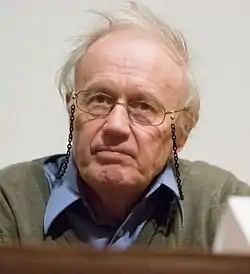 |
2002 | Visiting Professor, 04/1973, 07/1974 Bethe Lecturer, 04/1980 Visiting Scientist, 01/1983–08/1983[22] |
"for pioneering contributions to the theory of superconductors and superfluids" |
| 18 | François Englert
Co-recipient with Peter Higgs |
 |
2013 | Research associate and assistant professor 1959-1961 | "for the theoretical discovery of a mechanism that contributes to our understanding of the origin of mass of subatomic particles, and which recently was confirmed through the discovery of the predicted fundamental particle"[23] |
| 19 | David J. Thouless
Co-recipient with Duncan Haldane and John M. Kosterlitz |
 |
2016 | Ph.D. 1958 | "for theoretical discoveries of topological phase transitions and topological phases of matter"[24] |
| 20 | John M. Kosterlitz
Co-recipient with Duncan Haldane and David J. Thouless |
 |
2016 | Postdoctoral researcher 1973-1974 | "for theoretical discoveries of topological phase transitions and topological phases of matter"[25] |
| 21 | Kip Stephen Thorne
Co-recipient with Rainer Weiss and Barry C. Barish |
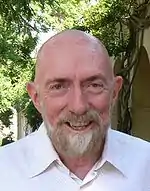 |
2017 | A.D. White Professor-at-Large, 1986–1992 Visiting Senior Research Associate, 01/1977 – 06/1977 Hans Bethe Lecturer 1986 Yervant Terzian Memorial Lecture, 2016[26] |
"for decisive contributions to the LIGO detector and the observation of gravitational waves"[27][28] |
| 22 | Arthur Ashkin | .jpg.webp) |
2018 | Ph.D. 1952 [29] | "for groundbreaking inventions in the field of laser physics" “for the optical tweezers and their application to biological systems”[30][31] |
| 23 | Roger Penrose |  |
2020 | Visiting Researcher (1968-69)[32][33] | "for the discovery that black hole formation is a robust prediction of the general theory of relativity."[34] |
Nobel Prize in Chemistry
| No. | Laureate | Image | Year | Relation | Rationale |
|---|---|---|---|---|---|
| 1 | Peter Debye | 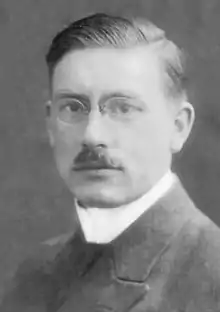 |
1936 | Professor of Chemistry, 1940-1952 | "for his contributions to the study of molecular structure," primarily referring to his work on dipole moments and X-ray diffraction |
| 2 | Otto Hahn | 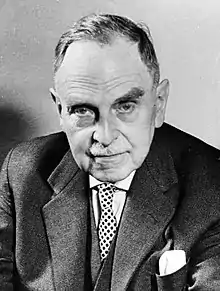 |
1944 | George Fisher Baker Non-Resident Lecturer in Chemistry 1933[35] | "for his discovery of the fission of heavy atomic nuclei." |
| 3 | James B. Sumner | 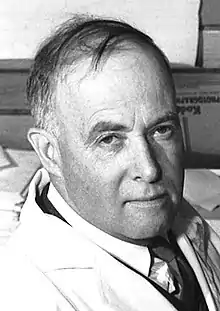 |
1946 | Professor of Biochemistry/Nutrition 1929–1955; took emeritus status in 1955 | |
| 4 | Vincent du Vigneaud | 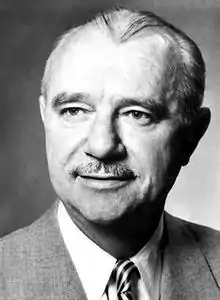 |
1955 | Professor, Cornell Medical College 1938–1967 Professor Emeritus, Ithaca campus 1967–1974 |
"for his work on biochemically important sulphur compounds, especially for the first synthesis of a polypeptide hormone" |
| 5 | Manfred Eigen |  |
1967 | A.D. White Professor-at-Large | |
| 6 | Paul Flory | 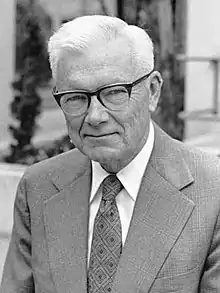 |
1974 | Chemistry faculty, 1948–1957 | "for his fundamental achievements, both theoretical and experimental, in the physical chemistry of the macromolecules"[36] |
| 7 | Roald Hoffmann
Co-recipient with Kenichi Fukui |
 |
1981 | Professor of Chemistry, 1965–Present | "for their theories, developed independently, concerning the course of chemical reactions"[37] |
| 8 | Henry Taube | _(cropped).jpg.webp) |
1983 | Instructor and Assistant Professor(1941-1946) | "for his work on the mechanisms of electron transfer reactions, especially in metal complexes."[38] |
| 9 | Richard R. Ernst |  |
1991 | A.D. White Professor-at-Large, 1998 | "for his contributions to the development of the methodology of high resolution nuclear magnetic resonance (NMR) spectroscopy"[39] |
| 10 | Eric Betzig | .jpg.webp) |
2014 | M.S. 1985, Ph.D. 1988 - Applied and Engineering Physics | "for the development of super-resolved fluorescence microscopy"[40] |
| 11 | William E. Moerner | 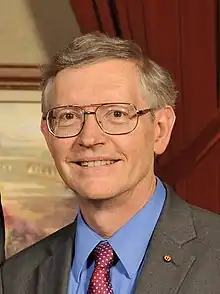 |
2014 | M.S. 1978, Ph.D. 1982 - Physics | "for the development of super-resolved fluorescence microscopy"[41] |
| 12 | Joachim Frank
Co-recipient with Jacques Dubochet and Richard Henderson |
.jpg.webp) |
2017 | Postdoctoral researcher 1972[42][43][44] | "for developing cryo-electron microscopy for the high-resolution structure determination of biomolecules in solution"[45] |
Nobel Prize in Physiology or Medicine
| No. | Laureate | Image | Year | Relation | Rationale |
|---|---|---|---|---|---|
| 1 | Herbert Spencer Gasser | 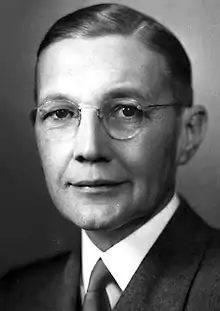 |
1944 | Cornell Medical College faculty 1931–1934 | |
| 2 | Hermann Joseph Muller | 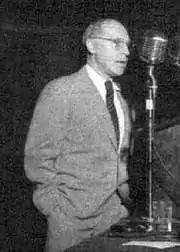 |
1946 | Cornell graduate student 1911–1912 | |
| 3 | Fritz Albert Lipmann | %252C_Biochemist_(2551001689).jpg.webp) |
1953 | Research Associate, Cornell Medical College 1939–1941 | "for his discovery of co-enzyme A and its importance for intermediary metabolism" |
| 4 | George Beadle | 1958 | PhD | ||
| 5 | Peter Medawar | 1960 | A.D. White Professor[46] | ||
| 6 | Haldan Keffer Hartline |  |
1967 | Associate Professor of Physiology, Cornell Medical College 1940–1941 | |
| 7 | Robert W. Holley
Co-recipient with H. Gobind Khorana and Marshall W. Nirenberg |
 |
1968 | Ph.D., 1946 Professor of Organic Chemistry, 1948–1966 |
"for their interpretation of the genetic code and its function in protein synthesis"[47] |
| 8 | Har Gobind Khorana | 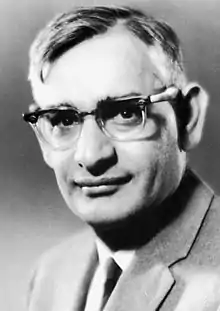 |
1968 | A.D. White Professor-at-Large, 1974–1980 | |
| 9 | Barbara McClintock | _shown_in_her_laboratory_in_1947.jpg.webp) |
1983 | B.S., 1923 M.A., 1925 Ph.D., 1927 Instructor in botany, 1927–1931 Andrew D. White Professor-at-Large, 1965–1974 |
"for her discovery of mobile genetic elements"[48] |
| 10 | Harold Varmus |  |
1989 | Professor of Medicine, 2015-Present | "for [his] discovery of the cellular origin of retroviral oncogenes" |
| 11 | Robert F. Furchgott | 1998 | Research Associate (Medicine)/Instructor (Physiology and Biophysics/Assistant Professor Medicine), 1941–1949 | "for [his] discoveries concerning nitric oxide as a signalling molecule in the cardiovascular system"[49] | |
| 12 | Paul Greengard | 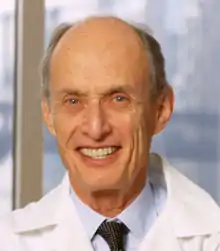 |
2000 | A.D. White Professor-at-Large, 1981–1987 | "for [his] discoveries concerning signal transduction in the nervous system"[50] |
| 13 | Jack W. Szostak
Co-recipient with Elizabeth H. Blackburn and Carol W. Greider |
 |
2009 | Ph.D. 1977 - Biochemistry | "for the discovery of how chromosomes are protected by telomeres and the enzyme telomerase"[51] |
| 14 | James P. Allison | .JPG.webp) |
2018 | Professor of Weill Cornell Medicine, Cornell University, 2004–2012 | "for discovery of cancer therapy by inhibition of negative immune regulation" |
| 15 | Charles M. Rice | 2020 | Adjunct Professor |
Nobel Memorial Prize in Economics
| No. | Laureate | Image | Year | Relation | Rationale |
|---|---|---|---|---|---|
| 1 | Robert Fogel | 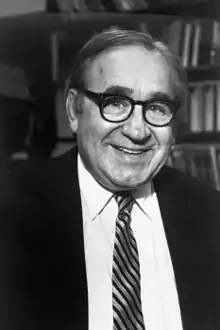 |
1993 | B.A., 1948 | "for having renewed research in economic history by applying economic theory and quantitative methods in order to explain economic and institutional change"[52] |
| 2 | Amartya Sen | 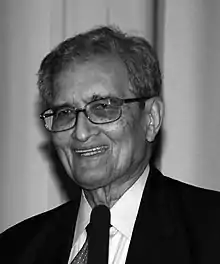 |
1998 | A.D. White Professor-at-Large, 1978–1984 | "for his contributions to welfare economics"[53] |
| 3 | Robert F. Engle | 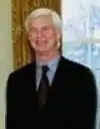 |
2003 | M.S., 1966,
Ph.D., 1969 |
"for methods of analyzing economic time series with time-varying volatility (ARCH)"[54] |
| 4 | Dale Mortensen | 2010 | Visiting Professor of Economics (Fall 1984)[55] | ||
| 5 | Richard Thaler | 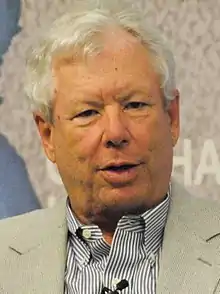 |
2017 | Professor of Economics and the Henrietta Johnson Louis Professor of Management, Johnson Graduate School of Management, Cornell University, 1978–1995[56][57][58][59] | "for his contributions to behavioural economics"[60] |
Nobel Prize in Literature
| No. | Laureate | Image | Year | Relation | Rationale |
|---|---|---|---|---|---|
| 1 | Pearl S. Buck | 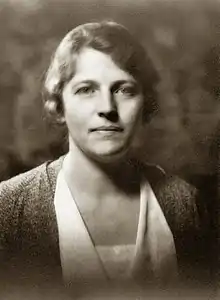 |
1938 | M.A., 1925 | "for her rich and truly epic descriptions of peasant life in China and for her biographical masterpieces"[61] |
| 2 | Wole Soyinka | .jpg.webp) |
1986 | Senior Fellow, Society for the Humanities, 1985 Goldwin Smith professor for African Studies and Theatre Arts, 1988-1991[62][63] |
"who in a wide cultural perspective and with poetic overtones fashions the drama of existence"[64] |
| 3 | Octavio Paz | 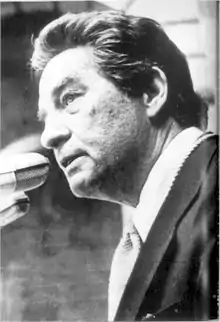 |
1990 | A.D. White Professor-at-Large, 1972-1974 | "for impassioned writing with wide horizons, characterized by sensuous intelligence and humanistic integrity"[65] |
| 4 | Toni Morrison | 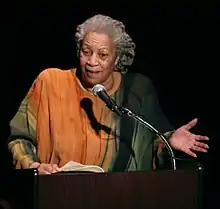 |
1993 | M.A. 1955 - English
A.D. White Professor-at-Large, 1997–2003 |
"who in novels characterized by visionary force and poetic import, gives life to an essential aspect of American reality"[66] |
Nobel Peace Prize
| No | Laureate | Image | Year | Relation | Rationale |
|---|---|---|---|---|---|
| 1 | John Mott
Co-recipient with Emily Greene Balch |
 |
1946 | B.S. 1888 - Philosophy | "Chairman, International Missionary Council; President, World Alliance of Young Men's Christian Associations"[67] |
| 2 | Norman Borlaug | 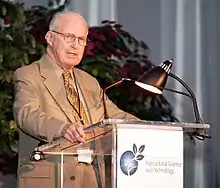 |
1970 | A.D. White Professor-at-Large, 1982–1988 |
See also
Notes
- This is because, according to Wikipedia policies on no original research and objectivity/neutrality, it is not possible in Wikipedia to subjectively assign various weights to different types of affiliations.
- The table doesn't provide citations or details on entries; for citations and details, see "Nobel laureates by category".
References
- "Alfred Nobel – The Man Behind the Nobel Prize". Nobel Foundation. Archived from the original on 2008-10-16. Retrieved 2008-10-18.
- "The Nobel Prize". Nobel Foundation. Archived from the original on 2008-10-19. Retrieved 2008-10-18.
- "Nobel Laureates Affiliated with Cornell University | Cornell Chronicle". news.cornell.edu. Retrieved 2019-04-17.
- "Nobel Laureates Affiliated with Cornell University". Cornell University. Retrieved 2011-03-18.
- "CCB Announces the 2017 Baker Symposium | Chemistry & Chemical Biology Cornell Arts & Sciences". chemistry.cornell.edu. Retrieved 2019-03-27.
- "Andrew D. White Professors-at-Large | Program for". Retrieved 2019-03-27.
- "The Nobel Prize in Chemistry 1971". NobelPrize.org. Retrieved 2020-10-15.
- "George Fischer Baker Lectures". PaulingBlog. Retrieved 2020-10-15.
- "The Nobel Prize in Physics 1944". Nobel Foundation. Archived from the original on 2009-08-30. Retrieved 2009-10-17.
- "The Nobel Prize in Physics 1967". www.nobelprize.org. Retrieved 2018-06-17.
- "The Nobel Prize in Physics 1970". www.nobelprize.org. Retrieved 2018-06-17.
- "The Nobel Prize in Physics 1972". www.nobelprize.org. Retrieved 2018-06-17.
- "Biography of Brian D. Josephson from Nobel Official site". Archived from the original on 2017-08-30.
- "The Nobel Prize in Physics 1973". Archived from the original on 2017-04-07.
- "The Nobel Prize in Physics 1979". Nobel Foundation. Archived from the original on 2009-02-26. Retrieved 2009-03-17.
- Nobelprize Physics 1982 Archived 2016-08-16 at the Wayback Machine
- "The Nobel Prize in Physics 1991". www.nobelprize.org. Retrieved 2018-06-17.
- "Biography of Russell A. Hulse from Notable Names Database". Archived from the original on 2012-06-04.
- "The Nobel Prize in Physics 1993". Archived from the original on 2017-06-13.
- "The Nobel Prize in Physics 1996". Nobel Foundation. Archived from the original on 2009-02-12. Retrieved 2009-05-15.
- "Six A.D. White Professors-at-Large elected". Cornell Chronicle. Retrieved 2020-10-15.
- "Archived copy". Archived from the original on 2016-10-26. Retrieved 2016-04-22.CS1 maint: archived copy as title (link)
- "Physics 2013" (PDF). Nobel Foundation. Archived (PDF) from the original on 2013-10-08. Retrieved 2013-10-08.
- "Physics 2016". Nobel Foundation. Archived from the original on 2016-10-04. Retrieved 2016-10-04.
- "Physics 2016". Nobel Foundation. Archived from the original on 2016-10-04. Retrieved 2016-10-04.
- "Archived copy". Archived from the original on 2017-09-23. Retrieved 2017-10-06.CS1 maint: archived copy as title (link)
- "Physics 2017". Nobel Foundation. Archived from the original on 2017-10-03. Retrieved 2017-10-03.
- http://physics.cornell.edu/news/nobel-prize-winning-work-has-roots-cornell-research
- "The Optical Society: Arthur Ashkin".
- "The Nobel Prize in Physics 2018". NobelPrize.org. Retrieved 2018-10-02.
- "Arthur Ashkin, Gérard Mourou and Donna Strickland win the Nobel Prize for Physics – Physics World". Physics World. 2018-10-02. Retrieved 2018-10-02.
- "Roger Penrose - Biography". Maths History. Retrieved 2020-10-12.
- "Structure of space-time (Roger Penrose)". INSPIRE. Retrieved 2020-10-15.
- "The Nobel Prize in Physics 2020". NobelPrize.org. Retrieved 2020-10-15.
- "Archived copy". Archived from the original on 2017-06-30. Retrieved 2017-06-14.CS1 maint: archived copy as title (link)
- "The Nobel Prize in Chemistry 1974". www.nobelprize.org. Retrieved 2018-06-17.
- "The Nobel Prize in Chemistry 1981". Nobel Foundation. Archived from the original on 2009-06-14. Retrieved 2009-05-15.
- "The Nobel Prize in Chemistry 1983". NobelPrize.org. Retrieved 2020-10-15.
- "The Nobel Prize in Chemistry 1991". www.nobelprize.org. Retrieved 2018-06-17.
- "Chemistry 2014". Nobel Foundation.
- "Chemistry 2014". Nobel Foundation.
- "Archived copy". Archived from the original on 2017-10-09. Retrieved 2017-10-05.CS1 maint: archived copy as title (link)
- Mossman, K (December 2007). "Archived copy". Proc. Natl. Acad. Sci. U.S.A. 104: 19668–70. Bibcode:2007PNAS..10419668M. doi:10.1073/pnas.0710323105. PMC 2148354. PMID 18056798.
- "Archived copy" (PDF). Archived (PDF) from the original on 2017-10-09. Retrieved 2017-10-04.CS1 maint: archived copy as title (link)
- "Physics 2017". Nobel Foundation. Archived from the original on 2017-10-04. Retrieved 2017-10-04.
- "Nobel Laureates Affiliated with Cornell University | Cornell Chronicle". news.cornell.edu. Retrieved 2020-10-15.
- "The Nobel Prize in Physiology or Medicine 1968". Nobel Foundation. Archived from the original on 2011-11-17. Retrieved 2011-11-05.
- "The Nobel Prize in Physiology or Medicine 1983". Nobel Foundation. Archived from the original on 2011-11-06. Retrieved 2011-11-05.
- "The Nobel Prize in Physiology or Medicine 1998". www.nobelprize.org. Retrieved 2018-06-17.
- "The Nobel Prize in Physiology or Medicine 2000". www.nobelprize.org. Retrieved 2018-06-17.
- "Medicine 2009". Nobel Foundation. Archived from the original on 2009-10-06. Retrieved 2009-10-05.
- "The Nobel Prize in Economics 1993". Nobel Foundation. Archived from the original on 2009-02-11. Retrieved 2009-03-17.
- "The Sveriges Riksbank Prize in Economic Sciences in Memory of Alfred Nobel 1998". www.nobelprize.org. Retrieved 2018-06-17.
- "The Nobel Prize in Economics 2003". Nobel Foundation. Archived from the original on 2009-02-05. Retrieved 2009-03-17.
- "CV (Dale T. Mortensen)" (PDF).
- "Nobel Laureates Affiliated with Cornell University | Cornell Chronicle". news.cornell.edu. Archived from the original on 2017-09-06. Retrieved 2017-10-10.
- "Richard H Thaler | The University of Chicago Booth School of Business". The University of Chicago Booth School of Business. Archived from the original on 2017-10-07. Retrieved 2017-10-09.
- "Congratulating Richard Thaler on Nobel Prize win in economics – Johnson School". Business Feed. 2017-10-10. Archived from the original on 2017-10-12. Retrieved 2017-10-12.
- "A 'playful' Nobel Prize winner laid groundwork for his field at Cornell | Cornell Chronicle". news.cornell.edu. Archived from the original on 2017-10-12. Retrieved 2017-10-12.
- "The Prize in Economic Sciences 2017". www.nobelprize.org. Archived from the original on 2017-10-02. Retrieved 2017-10-09.
- "The Nobel Prize in Literature 1938". Nobel Foundation. Archived from the original on 2009-02-18. Retrieved 2009-03-17.
- "Archived copy". Archived from the original on 2017-10-05. Retrieved 2017-10-05.CS1 maint: archived copy as title (link)
- "Archived copy" (PDF). Archived (PDF) from the original on 2017-10-05. Retrieved 2017-10-05.CS1 maint: archived copy as title (link)
- "The Nobel Prize in Literature 1986". www.nobelprize.org. Retrieved 2018-06-17.
- "The Nobel Prize in Literature 1990". www.nobelprize.org. Retrieved 2018-06-17.
- "The Nobel Prize in Literature 1993". Nobel Foundation. Archived from the original on 2009-03-21. Retrieved 2009-03-17.
- "The Nobel Prize in Peace 1946". Nobel Foundation. Archived from the original on 2009-03-26. Retrieved 2009-03-17.